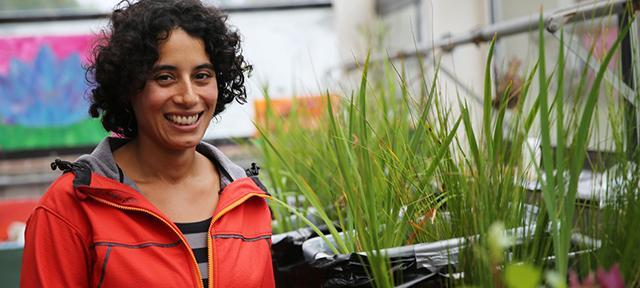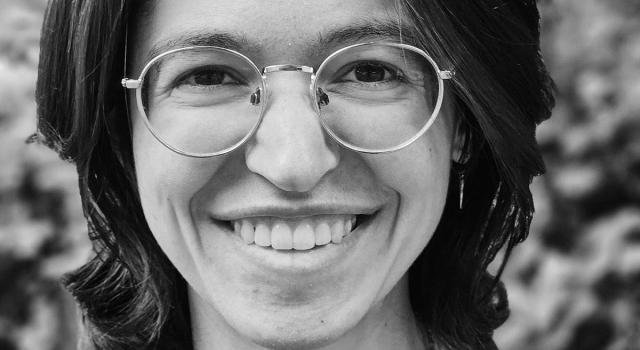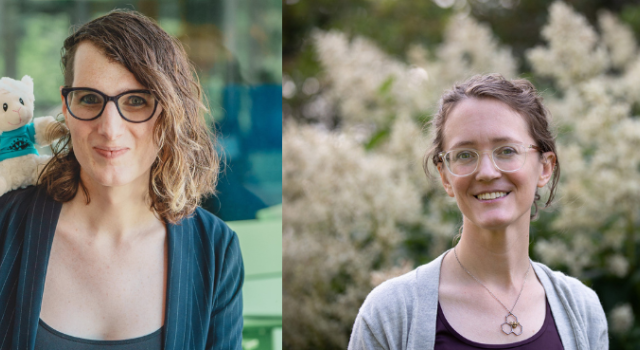Q&A with Seeta Sistla, Assistant Professor of Ecosystem Ecology

Seeta Sistla, Assistant Professor of Ecosystem Ecology, comes to Hampshire from the University of California Irvine, where she was based for two years as a NOAA Climate and Global Change Postdoctoral Fellow.
What are you working on now?
In addition to teaching and preparing for next semester’s courses, I’m tying up my research in Nicaragua. That work was very interdisciplinary, combining my background in biogeochemistry with researchers who study economics, demography, anthropology, and conservation biology. The goal is to better understand global-change phenomena of land-use and natural-resource decline from both a biological perspective and a human one. All of the global-change problems that natural scientists study are tied to people’s activities and decision making.
I’m also helping guide some Hampshire Division III students now. One student, Chiara Forrester, is studying the effects of fungal endophytes: fungi that live within plant-leaf tissues. We’re working here on some lab studies based on the work she did at the Rocky Mountain Biological Laboratory.
What excites you about your new role at Hampshire?
I really like the students. They’re very enthusiastic, very bright and motivated. They go above and beyond in terms of classwork. It reminds me of some of my best graduate seminars.
I think this is an interesting time to be alive and to be a student—to be at the cusp of the working world and to have all of these social, political, and environmental changes happening very rapidly. The world has kind of sped up, partly because of the Internet and its ability to connect people. There are a lot of pressing environmental problems, even beyond global warming. We have huge pollution problems, huge biodiversity loss.
It’s an intimidating time to be coming through college, but in terms of our understanding and our ability to address these problems, it’s also very exciting. When I was in college, we didn’t really talk about global change. That was just there in the background. That’s been quite a big change in the past decade. I think we have a more aware group of students, and that’s both humbling and heartening.
I’m also excited about the Farm Center. I recently toured it with Sustainability Initiative Director Beth Hooker, and I’m excited about being able to do work locally, using the farm as an active research site.
If you could be whimsical and teach any class beyond your area of expertise, what would you teach?
It would be fun to do a class on environmental film that mixes readings with film. A lot of films have come out in the last decade or two that have beautiful ways of conveying environmental issues from a variety of perspectives, everything from funny ones like Cane Toads—a movie about an invasive species in Australia—to much more serious films about climate change and its effects on people and habitats. Putting those films together in a methodological and analytical way would be enjoyable.
Can you recommend a book you like?
This is a fun read: The Book of Deadly Animals, by Gordon Grice. It’s trying to help readers reevaluate their place in nature. People are part of the natural world. Even seemingly benign things like mosquitoes have caused a lot of death and suffering for people, but things perceived to be very dangerous—like sharks—have very little impact on us versus what we have on them. It’s also fun because there are a lot of weird, gory stories.
I’m going to look it up! What would you say is your favorite book of all time?
One Hundred Years of Solitude, by Gabriel García Márquez. I skipped school a few days during my senior year of high school to sit in a bookstore and just read that book. I fell in love with it. I’ve read it several times again as an adult, and it transports you to a different world. It captures the human condition more than any other book I’ve ever read.
What’s the coolest fact about you?
I’m face-blind. I don’t know if that’s cool or sad.
Well, now people will know the reason you don’t say “Hey” to them when they pass you!
Yeah. It’s a small school and I have a hard time recognizing people—even people I know very well, if they change their hair or something about their dress. I’ve had this my whole life, but I thought everyone was like that until my twenties. People accuse me all the time of not wearing glasses, but it’s not that—I’ve misrecognized my own husband, so it’s pretty bad!



